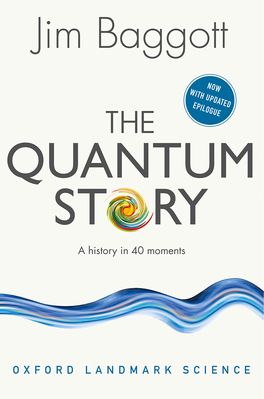The Quantum Story

The Quantum Story
|
ISBN: |
9780198784777 |
|
Binding: |
Paperback |
|
Published: |
4 Apr 2016 |
|
Availability: |
|
|
Series: |
$32.95 AUD
$37.99 NZD
Description
The twentieth century was defined by physics. From the minds of the world's leading physicists there flowed a river of ideas that would transport mankind to the pinnacle of wonderment and to the very depths of human despair. This was a century that began with the certainties of absolute knowledge and ended with the knowledge of absolute uncertainty. It was a century in which physicists developed weapons with the capacity to destroy our reality, whilst at the same time denying us the possibility that we can ever properly comprehend it.
Almost everything we think we know about the nature of our world comes from one theory of physics. This theory was discovered and refined in the first thirty years of the twentieth century and went on to become quite simply the most successful theory of physics ever devised. Its concepts underpin much of the twenty-first century technology that we have learned to take for granted. But its success has come at a price, for it has at the same time completely undermined our ability to make sense of the world at the level of its most fundamental constituents.
Rejecting the fundamental elements of uncertainty and chance implied by quantum theory, Albert Einstein once famously declared that 'God does not play dice'. Niels Bohr claimed that anybody who is not shocked by the theory has not understood it. The charismatic American physicist Richard Feynman went further: he claimed that nobody understands it.
This is quantum theory, and this book tells its story.
Jim Baggott presents a celebration of this wonderful yet wholly disconcerting theory, with a history told in forty episodes -- significant moments of truth or turning points in the theory's development. From its birth in the porcelain furnaces used to study black body radiation in 1900, to the promise of stimulating new quantum phenomena to be revealed by CERN's Large Hadron Collider over a hundred years later, this is the extraordinary story of the quantum world.
Oxford Landmark Science books are 'must-read' classics of modern science writing which have crystallised big ideas, and shaped the way we think.
Contents
Part I: Quantum in Action
1: An Act of Desperation: Berlin 1900
2: Independent Energy Quanta: Bern 1905
3: Quantum Numbers and Quantum Jumps: Manchester 1913
4: Wave-particle Duality: Paris 1923
5: Strangely Beautiful Interior: Helgoland 1925
6: A Late Erotic Outburst: Swiss Alps 1925
7: The Self-rotating Electron: Leiden 1925
Part II: Quantum Probability and Quantum Uncertainty
8: Quantum Probability: Göttingen 1926
9: The Whole Idea of Quantum Jumps Necessarily Leads to Nonsense: Copenhagen 1926
10: Uncertainty Principle: Copenhagen 1927
11: The Copenhagen Interpretation: Copenhagen 1927
12: Complementarity: Lake Como 1927
Part III: Quantum Interpretation
13: Gedankenexperiment: Brussels 1927
14: An Absolute Wonder: Cambridge 1927
15: A Certain Unreasonableness: Brussels 1930
16: A Bolt from the Blue: Copenhagen 1935
17: The Paradox of Schrödinger's Cat: Oxford 1935
Part IV: Quantum Fields
18: Crisis: Shelter Island 1947
19: Quantum Electrodynamics: Oldstone 1949
20: Gauge Symmetry and Gauge Theories: Princeton 1954
21: Three Quarks for Muster Mark: Pasadena 1963
22: The Higgs Mechanism: Edinburgh 1965
Part V: Quantum Particles
23: Electro-weak Unification: Harvard 1967
24: Deep Inelastic Scattering: Stanford Linear Accelerator Center 1967
25: Asymptotic Freedom and Quantum Chromodynamics: Harvard 1973
26: The November Revolution: Brookhaven and SLAC 1974
27: The W and Z Bosons: CERN 1983
28: Completing the Picture: Fermilab 1994
Part VI: Quantum Reality
29: Hidden Variables: Princeton 1951
30: Bell's Theorem: Geneva 1964
31: The Aspect Experiments: Paris 1982
32: Beating the Uncertainty Principle: Albuquerque 1991
33: Three-photon GHZ States: Vienna 2000
34: Reality, Whether Local or Not: Vienna 2007
Part VII: Quantum Gravity
35: That Damned Equation: Princeton 1967
36: The First Superstring Revolution: Aspen 1984
37: The Quantum Structure of Space: Santa Barbara 1986
38: No Consistency Without Contingency: Durham 1995
39: The Second Superstring Revolution: Los Angeles 1995
40: Resolving the Impasse: CERN 2008
Epilogue
Quantum Timeline
Name Index
Subject Index
Authors
Jim Baggott, Freelance science writer
Jim Baggott is a freelance science writer. He was a lecturer in chemistry at the University of Reading but left to work with Shell International Petroleum Company and then as an independent business consultant and trainer. His many books include Origins: The Scientific Story of Creation (OUP, 2015), Higgs: The Invention and Discovery of the 'God Particle' (OUP, 2012), and A Beginner's Guide to Reality (Penguin, 2005).
Reviews
Review from previous edition: 'A highly original and engaging account of the most important theory in science.' - Jim Al-Khalili
`Jim Baggott's survey of the history of the emergence of the twentieth century's most enigmatic but successful theory is a delight to read. It is clear, accessible, engaging, informative, and thorough. It illuminates an important, revolutionary era of modern science and the varied personalities behind it.' - Peter Atkins
`[A] wonderful histiry of the scientists and ideas behind quantum mechanics... The basic history behind the quantum revolution is well known, but no one has told it in quite such a compellingly human and thematically seamless way.' - Publishers Weekly
`Jim Baggott's inspired -- and inspiring -- idea of presenting the history of quantum physics in terms of 40 key moments works both an an introduction for the uninitiated and as a refresher for anyone who thinks they know the story. Even familiar stories come up fresh in these juxtapositions. Great to dip in to!' - John Gribbin
`an enjoyable addition to the overall quantum story' - Chemistry World
`A truly exceptional book' - CERN Courier
`An accessible and informative history' - Science magazine
`gripping story' - Flipside Magazine